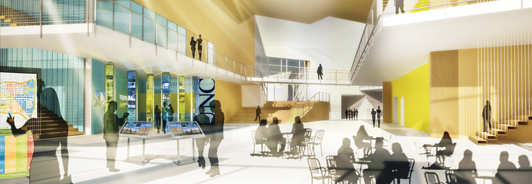News Briefs
Innovative Campus Commons Project Marches on
It's full steam ahead for UNC's Campus Commons project following a commitment from the state for its share of the funding and the selection of the project's architectural and construction firms.
The Campus Commons will be an innovative navigation and support hub for students, a showcase for UNC's world-class music and musical theater programs, and a gateway to UNC for the community and prospective students. In addition to space for a fully integrated student support operation, it will include a 600-seat performance venue, 400-seat multiuse auditorium, art gallery and student-run cafe.
After Colorado approved $23 million in the current fiscal year for the building, UNC selected the Denver-based architectural firms of Semple Brown Design and Handprint Architecture to design the building and chose Adolfson & Peterson Construction to manage the Commons' construction.
A combination of state capital funds, bonds supported by a student capital fee and private donor gifts will fund the $73.6 million building. The Commons will be located south of the University Center, near the intersection of 11th Avenue and 22nd Street, and will be designed to work in tandem with the UC. A committee of faculty, staff and students has been created to ensure campus-wide engagement in the design and building process, gather feedback and communicate with campus and beyond. Construction is scheduled to begin in summer 2016.
The project is a crucial element in delivering on UNC's promise to provide students first-rate academic programs, customized learning opportunities and individual support, and a critical component of the school's growth strategy.
Campus Commons website
Letters Bring Civil War to Life
"Dear Parents I received your letter this afternoon and was glad to here (sic) from you. Lute and I are well and as fat as bears..."
So begins a letter from Union Army soldier Daniel Parker to his parents, written on March 23, 1862. The letter is one of a collection of handwritten letters penned by Civil War soldiers that chronicle their experiences in battle and the hardships they faced from 1861 through 1865.
Alumna Dawn Pfeiffer (BAE-87, MA-95) donated the letters to UNC's Teaching with Primary Sources program located at Michener Library. The TPS program offers workshops to K-12 educators on the use of digitized primary sources.
University Libraries recently completed the project to digitize the collection and you can view scanned versions of the letters online at https://digarch.unco.edu.
App Improves Your Writing
Scribe Bene (Latin for "write well") is an app for Microsoft Word co-developed by UNC Assistant Professor Susan Gould. It reviews documents and identifies writing pitfalls like vague words or passive voice, cueing the writer to replace them with more specific words or change a phrase or sentence to the active voice.
Gould, who teaches in UNC's Nutrition Dietetics program, taught business communications before earning advanced degrees in food science and human nutrition. She collaborated on the app with her husband, a retired Colorado State University business communications professor, along with one of his former colleagues, and worked with them on a study that showed how college students' writing improved by using the app. The app and study were featured by Money magazine in an online story.
 UNC Audiologist Speaks Twice at World Health Organization Headquarters
UNC Audiologist Speaks Twice at World Health Organization Headquarters
At the request of the World Health Organization, UNC Professor of Audiology Deanna Meinke presented at two WHO events at the organization's headquarters in Geneva, Switzerland.
In October, during the WHO-ITU (International Telecommunication Union) Joint Stakeholders' Consultation, Meinke presented outcomes from a survey of music listeners from multiple countries regarding their view of safe listening strategies. The UNC professor is a sought-after expert and speaker. As an invited panelist at a WHO conference last March, she discussed her experience with the Dangerous Decibels program she co-directs. The initiative includes a student-involved project that uses sound-level meters placed in mannequins' ears to visually demonstrate the volume produced by personal music players.
It's a topic with far-reaching implications. The WHO estimates 1.1 billion young people worldwide could be at risk of hearing loss due to unsafe listening practices like unsafe sound levels from personal audio devices.
 Webster Named Vice President for Development and Alumni Relations
Webster Named Vice President for Development and Alumni Relations
In August, UNC President Kay Norton appointed Wayne Webster as the vice president for Development and Alumni Relations. He leads the university's fundraising and alumni relations programs, overseeing gift giving and campaign initiatives, including UNC's signature project, the Campus Commons.
Before coming to UNC, Webster was vice president for Advancement at Ripon College in Wisconsin where Ripon's endowment grew from $52 million to $85 million and Webster led a successful campaign that raised more than $60 million.
Webster earned a doctorate degree in higher education administration from George Washington University and a master's in management from Doane College. A Colorado native, he graduated from Rocky Ford High School and has ties to UNC; his parents, Deborah Webster and Stephen Webster, earned degrees from UNC.
"Wayne is a great addition to our UNC team," said Norton. "He has clearly been a successful leader for his previous institutions, not the least because he is an engaging listener and colleague. He is joining us at a pivotal time in our history, and we look forward to his contributions."
Medical Anthropology Class' Project Targets Health Care
Students in Assistant Professor of Anthropology Whitney Duncan's spring semester medical anthropology course surveyed patients of the non-profit Salud Family Health Centers and the general public and presented their preliminary findings during UNC's annual Research Day in April. Their work contributes to Duncan's research project, "Project HealthViews," investigating understandings, experiences and perceptions of health and health care. Salud provides health services primarily for low-income, medically underserved residents and migrant and seasonal farmworkers. Using data from patient surveys helps them assess their work as a patient-centered medical center and improve health care delivery. Survey results will also broaden understanding of how different populations view their health status and make decisions about seeking treatment; what role culture, ethnicity, gender, socioeconomic status and insurance coverage play in access to treatment and satisfaction with care; and what variables might contribute to positive and negative treatment experiences.





